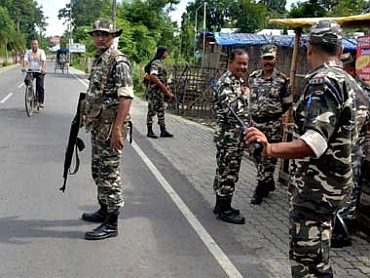Guwahati, Jun 5: In one of the most deadly attacks on the Army, at least 20 soldiers were killed and a dozen injured when militants laid an ambush on Thursday morning in Manipur.
The attack comes close on the heels of a renewed demand in the state to repeal the controversial Armed Forces Special Powers Act (AFSPA).
Sources said the attack took place when soldiers from 6 Dogra Regiment were being de-inducted from Moltuk valley in the insurgency-infested Chandel district.
Around 8 am, the soldiers left their base for Imphal in three trucks with camp equipment and fuel. Twenty minutes later, the convoy reached Tengnoupal around 120 km south-west of capital Imphal, where it was ambushed.
Sources said 50 militants laid the ambush and fired upon the convoy with Rocket Propelled Grenades and other automatic weapons.
The convoy came under heavy fire from both sides of the road, sources added.
The Army contingent had very little time to react and could not retaliate. Sources in the Manipur Police said the militants might have used Improvised Explosive Devices (IEDs) to inflict maximum casualty. The Manipur Police, however, said that one militant was killed in the retaliatory fire and several others were injured.
A joint platform of militant groups from the North-East has claimed responsibility for the attack. In a statement, the rebel groups claimed that a combined team of Elite Strike Unit of Naga Army, KYKL and KCP ambushed a five-vehicle Army convoy. The attack started around 6 am and lasted till 10 am.
The outfits claimed that the joint offensive was launched to assert their right for self-determination and sovereignty.
Sources told Deccan Herald that the attack was planned at a recent meeting of top militant leaders of the North-East in Taka area of Sagaing division of Myanmar.
United Liberation Front of Assam (Independent) chief Paresh Barua on Thursday evening called up a TV channel in Guwahati and claimed that this is the beginning of unified attacks by all the banned militant groups of the North-East.
Indian intelligence sources have added that several banned militants groups from the North-East, including the United Liberation Font of Assam (ULFA-Independent), National Democratic Front of Bodoland (NDFB), the Peoples’ Liberation Army (PLA), the United National Liberation Front (UNLF) have their bases there and is guided by the NSCN-K.
“By plan of the attack it seems it can be the handiwork of a combined team of UNLF, PLA and NSCN-K. The aim is to create fear and send across a message that they are not down and out. Ever since NSCN-K broke out of ceasefire, the porous Indo-Myanmar border has been tense,” said a senior Military Intelligence officer.
In New Delhi, an Army spokesperson said 20 personnel were killed and at least 11 injured. Initially, the injured jawans were airlifted from the ambush site to Leimakhong Army Hospital located at GOC 57 Mountain Division, where five jawans succumbed to their injuries. Later, other injured jawans were airlifted to the Army Base hospital in Jorhat and Guwahati. The dead includes a Junior Commissioned Officer.
Meanwhile, the Manipur Police said that one militant was killed in the retaliatory fire and several others were injured.






Comments
Add new comment